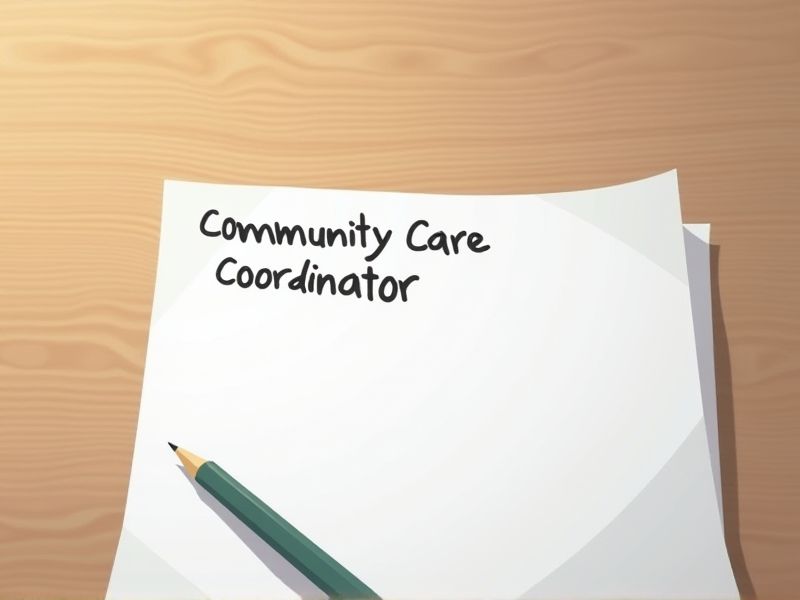
Community Care Coordinators play a pivotal role in ensuring that clients receive comprehensive and efficient support within healthcare systems. Certain certifications provide these coordinators with the necessary skills and knowledge to manage client interactions and resources effectively. With the increasing complexity of healthcare needs, these credentials assure both clients and employers of a coordinator's competence in addressing diverse challenges. Essential certifications for Community Care Coordinator could include Certified Case Manager (CCM), Accredited Case Manager (ACM), or Care Coordination and Transition Management (CCTM).
Certified Case Manager (CCM)
Certified Case Managers (CCMs) bring specialized expertise in coordinating complex care scenarios, directly improving outcomes in community settings. The CCM credential underscores standardized knowledge and skills, crucial for effective resource management and navigating healthcare systems. Comprehensive care coordination by CCMs often leads to reduced hospital readmissions, benefiting both patients and healthcare providers economically. In environments like community care, CCMs play a pivotal role in integrating interdisciplinary services, ensuring comprehensive and continuous patient care.
Certified Community Health Worker (CCHW)
Certified Community Health Workers (CCHW) are needed in community care coordination as they possess culturally relevant knowledge and connections, facilitating deeper trust with community members. Their role in promoting preventive care and health education directly contributes to improved health outcomes by empowering individuals to make informed health decisions. CCHWs often bridge gaps between healthcare systems and underserved populations, ensuring better access to necessary services and reducing healthcare disparities. Their ability to identify and address social determinants of health plays a critical role in holistic patient care and resource allocation.
Certified Patient Advocate (CPA)
A Certified Patient Advocate is essential for a Community Care Coordinator because they provide expert knowledge in navigating complex healthcare systems, ensuring that patients receive appropriate care. This specialization minimizes the risk of healthcare errors by enhancing communication between patients, families, and healthcare providers. The presence of a Certified Patient Advocate increases patient satisfaction by addressing individual concerns and personalizing care plans. Community Care Coordinators benefit from their expertise, which helps optimize resource allocation and improve overall care quality within the community.
CPR/AED Certification
Community Care Coordinators often work in environments where medical emergencies can arise, making CPR/AED certification crucial for immediate response. This certification empowers coordinators with the skills to support patients while waiting for professional medical assistance. Knowledge of CPR and AED usage can significantly increase survival rates during cardiac emergencies. Certification ensures coordinators can act confidently and efficiently in high-stress situations.
First Aid Certification
Having a First Aid Certification equips Community Care Coordinators with the necessary skills to respond effectively to health emergencies, thus reducing potential harm. With certified training, they can provide immediate assistance in critical situations, potentially saving lives before professional medical help arrives. It enhances their ability to assess and manage situations involving injuries or medical conditions, ensuring a safer environment for community members. Organizations often require certification to comply with legal and safety regulations, reflecting a commitment to providing comprehensive care.
Certified Health Education Specialist (CHES)
A Certified Health Education Specialist (CHES) provides specialized knowledge in health education, promoting effective health communication strategies within communities. This expertise enhances a Community Care Coordinator's ability to design and implement tailored health programs, improving community health outcomes. CHES professionals utilize evidence-based approaches, ensuring initiatives are both effective and sustainable. Their certification signifies a commitment to staying current on best practices, further elevating the quality of community care.
Certified Dementia Practitioner (CDP)
The increase in dementia cases amplifies the need for a Certified Dementia Practitioner (CDP) as a Community Care Coordinator to ensure tailored and effective care techniques. Proper training in dementia care methods enhances the ability of coordinators to manage challenging behaviors and improve client outcomes. A CDP provides valuable guidance to care teams, fostering a more cohesive and informed approach to dementia care. Legal and ethical awareness in dementia scenarios is heightened with a CDP, reducing risks for both care providers and patients.
Certified Health Coach (CHC)
A Certified Health Coach brings specialized knowledge in wellness and behavior change, enabling Community Care Coordinators to implement effective health improvement strategies. Demand for personalized health guidance grows, making the CHC's skills essential for addressing diverse healthcare needs in communities. A CHC helps reduce healthcare costs by promoting preventive care and healthy lifestyle adjustments in the population. Expertise in motivational interviewing and goal setting empowers community members to actively participate in their health journey.
Certified Professional in Healthcare Quality (CPHQ)
Certified Professional in Healthcare Quality (CPHQ) credentials enhance a Community Care Coordinator's ability to implement effective quality improvement initiatives, directly impacting patient care outcomes. This certification provides specialized knowledge in healthcare regulations and standards, which is crucial for ensuring compliance and maintaining high-quality care within community settings. As healthcare environments grow more complex, CPHQ's training equips care coordinators with the strategies needed to manage diverse patient populations effectively. Holding a CPHQ certification signals a commitment to excellence and ongoing professional development, influencing better patient engagement and satisfaction.
Project Management Professional (PMP)
The PMP certification enhances a Community Care Coordinator's ability to effectively manage and streamline complex projects, ensuring timely and organized delivery of services. A structured approach from PMP training helps in identifying risks and implementing mitigation strategies, reducing the likelihood of disruptions in care services. With PMP skills, coordinators can optimize resource allocation, ensuring that communities receive adequate and consistent care without wastage. Effective communication and stakeholder management skills gained from PMP training facilitate better collaboration with healthcare teams and community stakeholders, improving overall service outcomes.
Summary
You can expect an enhanced level of trust and credibility in the Community Care Coordinator's abilities when they obtain certifications. With certifications, you will likely see improved patient outcomes due to the coordinator's increased knowledge and skills. Your access to high-quality care coordination will potentially grow as certified coordinators bring innovative practices to the community. Certifications may also provide the co-ordinator opportunities to leverage advanced tools and methodologies for more efficient care management.
